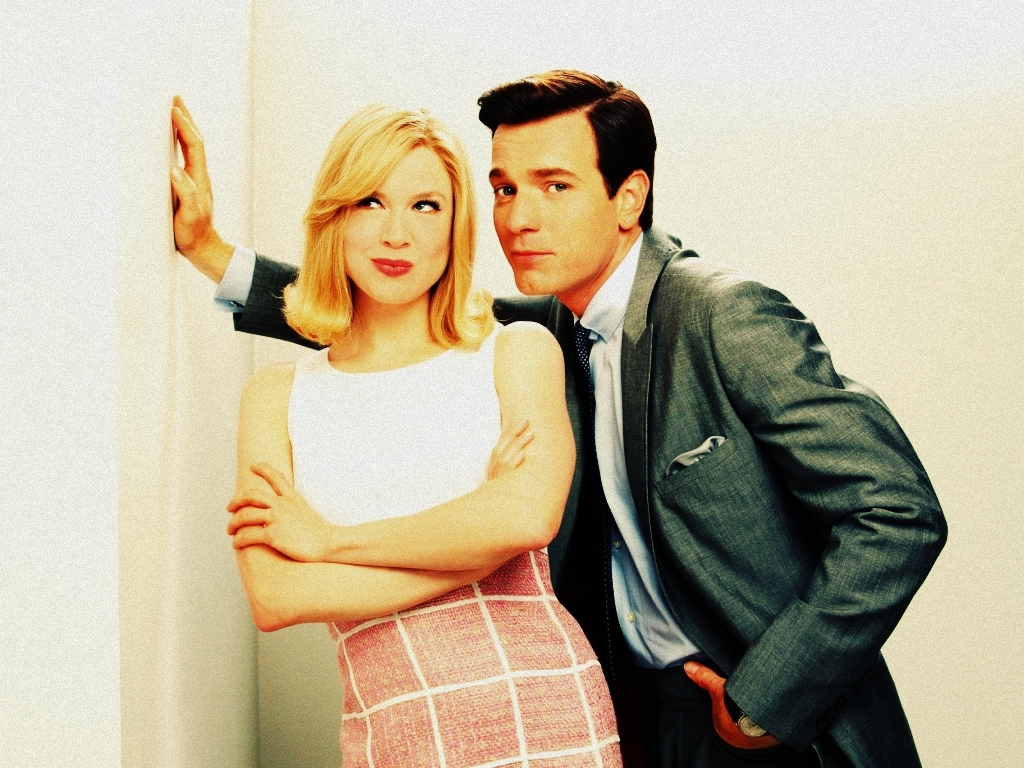To call Down with Love (2003) a parody of the ‘50s/’60s sex comedies does the film a huge disservice. Certainly, the film’s hyper-stylized aesthetic, loony soundtrack and comedic performances draws attention to its cartoony artifice, perhaps at the expense of its meticulous commentary on the changing gender relations of the ‘60s. Yet the film is not merely a formal exercise in reappropriation for comedic effect but an ideological re-imagining of the rom-com subgenre so titillatingly popular in its heyday. Down with Lovecannot be appreciated without having seen the films it spoofs–namely Pillow Talk (1959), one of many Doris Day/Rock Hudson vehicles with which Down with Love loosely shares narrative elements (including Tony Randall, who gives a brilliant cameo in the new film).
In Pillow Talk, Jan Morrow (Doris Day) is a driven, successful interior decorator forced to share a party line with a Mr. Brad Allen (Rock Hudson), a Broadway songwriter and, to Jan’s chagrin, a playboy who ties up the line delivering telephonic serenades to his many girlfriends. Jan’s disgruntled disposition towards Brad’s wooing methods becomes a source of delight for the viewer upon Brad’s chance discovery that she is not the homely spinster he once imagined but, well, the formidably attractive Day. And so he fashions a southern accent and convinces Jan–and in the process himself, unwittingly–to fall in love. Catcher Block (Ewan McGregor) similarly snubs, is enchanted by, and fools self-help author Barbara Novak (Renée Zellweger) in Down with Love. When lothario-journalist Catcher–”ladies’ man, man’s man, man about town”–realizes that Novak is not an ugly spinster, he becomes a bashful southern astronaut named Zip Martin to trick Barbara into falling in love with him so that he can write a nasty exposé on the woman who is supposedly Down with Love.
Director Peyton Reed pulls all the stops in recreating a whimsical 1962 Manhattan in Down with Love: female characters are all ‘60s glamor; the settings are Jetsonian in their lofty sizes, bright colors and sheer artifice; a wacky, over-present soundtrack underscores each and every over-the-top droll line of dialogue. If sex comedies are comedies without the sex, Down with Love, to paraphrase Reed, is a musical without the music.
While the overall effect gives Down with Love a fun, albeit trite tone, it’s simultaneously reaching for something more substantial: by hyper-satirizing the ‘60s, the film acknowledges that we simply cannot know that era authentically. The film distances us from the past in order to play with the conventions of the sex comedy and re-imagine a more gender-balanced battle of the sexes. This is not to deny the gender-bending functions of Pillow Talk, but those were appropriate and accurate only in a period in which the sexual revolution had yet to happen.
In Pillow Talk, both Jan and Brad are presented as headstrong characters and yet, he still manages to snag her by film’s end. While Brad’s chicanery is deemed unscrupulous by Jan, her revenge in turning his bachelor pad into a bohemian jungle allows her to save face and get over his deception. Their undeniable chemistry inevitably must lead to committed love but what about her autonomy as a career woman? Questions about her future–does she continue as a decorator or become a housewife?–are left unanswered. Down with Love’s “twist” ending is an elegant 2000s-era answer to the formulaic sex comedy ending.
It’s also utterly preposterous: once Catcher starts secretly taping Barbara admitting she loves him, he finds that he’s the one being duped. There is no Barbara Novak. She’s Nancy Brown, his one-time secretary who fell so hard for him–and was routinely forgotten about in typical Catcher fashion–that she had to devise the only plan that could possibly get him to fall in love with her. She would reinvent herself into a glamorous woman, write a self-help book encouraging women to embrace their individuality and enjoy sex “a la carte” like men, and earn enough scorn from Catcher so that he would attempt to ruin her image by getting into her pants. The film doesn’t end there–the denouement sees another few twists thrown in before the two have settled the score enough so that they can get married. But in this fantastical version of 1962, marriage is only possible through compromise: Barbara won’t sacrifice her successful career to be with Catcher, and he’s more than willing to accept that. It’s unlikely most men in 1962 would have been so welcoming to such audacious autonomy from a woman, but it does hint at the gender equality women fought so hard to achieve (and continue to do so) in the following decades.

